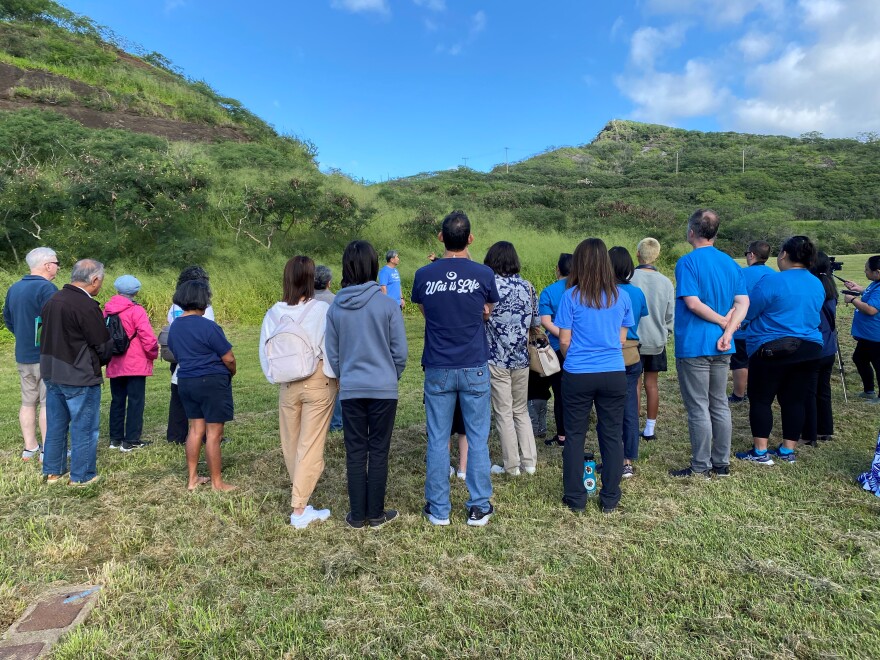The military is four months into defueling its Red Hill underground storage facility. The tanks have been drained of more than 100 million gallons of fuel. This week, the military will start removing residual fuel from pipelines.
Removing the fuel is a key step toward closing the Red Hill Bulk Fuel Storage Facility as demanded by the state of Hawaiʻi.
The head of the Honolulu Board of Water Supply, Ernest "Ernie" Lau, says it's still too soon to reopen its Halawa Shaft, which was shut down along with two other wells following the fuel contamination of the Navy's water system at Pearl Harbor in 2021.
Lau says he doesn’t want to take any chances with Honolulu’s drinking water. He fears using the Halawa Shaft will draw contaminants into the BWS system.
He hopes the Navy will be forthcoming as Red Hill nears the end of its lifespan. He is drawing the line on the military's responsibility to the community after not acknowledging the risk to the drinking water until people began getting sick two years ago.
Thousands of people on the Navy water system suffered nausea, headaches, rashes and other symptoms.
"There is no reason to keep information regarding the history and experiences of this facility over its 80-year life confidential. It doesn't need to be redacted because this is no longer going to be an operational facility in a few years," he told HPR.
"So it's a great opportunity for the Navy and the Department of Defense now to just open up all the information they have, unredacted, to us and to the regulators and to the community, so we know exactly what we're dealing with."
Lau estimates that roughly 2 million gallons of fuel have leaked from the Red Hill tanks over their 80-year lifespan. He has had many sleepless nights over what's in our water as a result of fuel spills at Red Hill.
"We know below the tanks and in the vicinity of the tanks that petroleum hydrocarbons and other things are being detected in the groundwater of the aquifer itself," he said.
Ten years ago on Jan. 13, 2014, the Navy reported another massive leak of jet fuel from one of its 20 underground fuel storage tanks at Red Hill. Routine maintenance had just been completed on tank five, but an estimated 27,000 gallons leaked while it was being refilled. The fuel has not been recovered.

This past Saturday, the Board of Water Supply marked the day with a blessing at a new water monitoring site near the Salt Lake Community Center. Those in attendance reflected on the 10th anniversary of the spill. Lau says the next decade will be key.
Marti Townsend was the head of the Sierra Club of Hawaiʻi during the 2014 spill. She says she is bitter about the experience. At the time, she was called an alarmist for saying the tanks posed a threat to the environment.
"It's really tough to sit here 10 years later and know that if we had started sooner in the remediation of the Red Hill fuel tanks, we could have saved so many people from so much hardship," she said. "But because we foolishly trusted the military, because the military did not take their obligation seriously, we are in this situation where people now have lifelong illnesses."
"We need to brace ourselves for further bad news about the state of our aquifer," Townsend said. "At the same time, I think, you know, we start now on figuring out how to clean up."
Wayne Tanaka, the current director of the Sierra Club, may have a tougher fight ahead.
"The healing of our lands, of our waters, it's going to take decades," Tanaka said. "It's super important, even as we look forward, to remember what we've gone through for the last 10 years: the lies, the gaslighting, the blind deference to the military. And remember that ultimately, it was the community stepping up, the community coalescing and fighting for our home and for our future."
The Conversation also spoke with a military wife whose family was impacted by the 2021 spill. Lacey Quintero says that from the first day her family moved into base housing, they began to get sick and didn't understand why.
"I still worry every single day about the water for the whole island because we know the aquifer was impacted," Quintero told HPR. She and her family moved off base after discovering fuel in their drinking water.
This story aired on The Conversation on Jan. 16, 2024. The Conversation airs weekdays at 11 a.m. on HPR-1.








